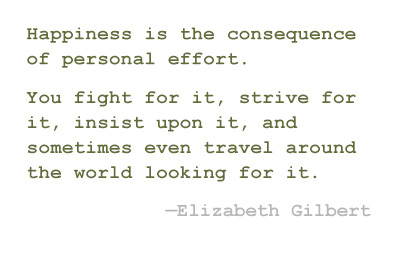
In her memoir, Eat, Pray, Love, Elizabeth Gilbert invited us to travel with her on a journey of self-discovery. It became a worldwide bestseller in large part because we humans love life-changing journeys.
The Elements of a Life-Changing Journey
Journeys, especially the ones that lead us to a better life, have a few things in common:
A beginning. This is almost always a place of yearning or unknowing. We embark on journeys because we feel there is something missing, some puzzle we need to solve. It’s a quest for answers to life’s squishy questions. We journey-goers have a deep desire to figure things out and make our lives better.
A desired destination. A journey without a destination is just an adventure. While it’s true the journey is more important than the destination, having a desired destination gives us direction, and purpose. We will meander and get lost along the way. And it's our desired destination that brings us back to our true path.
Obstacles. These can be physical challenges (literally). Like flat tires on our getaway bicycle, or an unexpected monsoon that makes the road impossible to travel. But they can also be internal challenges, like conquering our inner shame dragons.
Navigation tools. Useful tools might include maps (preferably drawn by someone who knows the way), signposts, smoke signals sent by spirits, or actual human guides. Think: sherpa. Someone who is intimately familiar with the terrain and can help us avoid the treacherous cliffs.
Self-discovery. As a result of the obstacles (above), we journey-goers often have deeply-personal revelations along the way. Spoiler alert: that’s the whole point of taking a journey. These powerful ah-ha moments are what transform us from mere mortals into happier, wiser mortals.
Time. The peak of Mount Everest isn’t reached in a day. Nor do any lasting life changes happen overnight. It’s the process of committing to the path and consistently walking toward your destination that gets you to where you want to go. There aren’t any shortcuts.
Your Personal Healing Journey
Perhaps I’m romanticizing the process of losing weight by referring to it as a healing journey.
But it fits. Here’s why:
- Healing takes time. Losing weight requires healing (physical, emotional, mindset, and spiritual). This takes time.
- You have a beginning. Something inside is calling you forward, whispering, "It's time." Start where you are— unsure, imperfect, afraid of failing... and just go.
- You have a desired destination. This is what keeps you going. What is it you really want? A deep desire to feel good in your body? A yearning to be free of emotional eating? A vision of an active future where your weight is never the thing holding you back?
- You will encounter obstacles. Some will make you want to quit. You’ll feel alone. You’ll be scared. Just keep going. The obstacles bring us to the best part…
- Self-discovery. Ahhh… That’s what we yearn for. Discovering who we are and accepting ourselves (flaws and all) is the real prize.
So, you see, losing weight is a life-changing, healing journey.
Not because we achieve some perfect weight or body size. But because in the process of self-discovery, we become healthier and happier. Both of which must happen before we see lasting weight loss.
Love,


